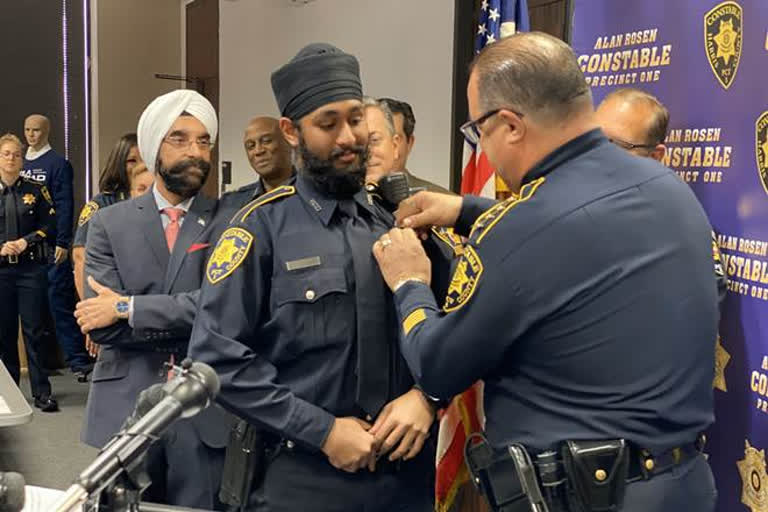Houston: Amrit Singh, an Indian-American law enforcement officer, has scripted history by becoming the first-ever turban-wearing Sikh to be sworn in as Deputy Constable in Harris County in the US state of Texas.
Singh, 21, will be the first in his profession to wear his articles of faith - a turban, beard, and uncut hair in the line of duty.
It was a historic day on Tuesday as Singh's swearing-in coincided with the adoption of a new policy that allows law enforcement officers in nearly every single Harris County Constable's Office to wear articles of their faith while in uniform. For Sikhs, that means being able to wear a turban and beard while on duty.
Singh always wanted to work as a peace officer. He spent years in law enforcement explorer programmes and five months in a police training academy.
"Growing up, I always wanted to be a deputy and my Sikh faith was also very important to me," Singh said.
"Constable Alan Rosen was the first one to give me a callback. He opened this agency with open arms for me," he said.
Speaking at Singh's swearing-in ceremony, Precinct 1 Constable Rosen said the county's eight constables supported accommodations for Sikhs to serve while adhering to their religion.
"As a man of the Jewish faith, I know how it feels to be religiously targeted and how important it is to teach inclusion, understanding and tolerance," Rosen said, standing in front of representatives from the county's other constable offices.
Also Read: US post office to be named after slain Sikh police officer
"To me, wearing a yarmulke or him wearing a turban really doesn't impact the quality of work he's going to do. It should have zero impact on public safety or what job we do. Are you going to care if the person showing up to your door to help save you has a turban or yarmulke? You're not. You're just happy they're there to save you and keep you safe," the officer said.
Singh will now go on to months of field training, after which he will be assigned to patrol within Precinct One.
In 2015, Harris County made national headlines after sheriff's deputy Sandeep Dhaliwal fought for and won the rights to wear his turban and beard on duty.
At the time of the deputy's murder last year, just a few dozen law enforcement agencies across the United States and the US Army had uniform policies with religious accommodations allowing Sikhs to serve in accordance with their faith.
"Legacy of Dhaliwal is not far removed, it clearly recognised and acknowledge his service and this is a gift that continues to give in his recognition and legacy," said Bobby Singh, a Sikh community leader.
In 2009, Dhaliwal was the first Sikh to join the Harris County Sheriff's Office and in 2015, he became the first Sikh law enforcement officer to be allowed to wear his articles of faith in uniform. He was shot and killed during a traffic stop last year.
"We honour his legacy by honouring his faith here today," Rosen said.
Also Read: Texas remembers 'trailblazer' Sikh police officer
In the months since Dhaliwal's death, law enforcement agencies in California, Washington and in Texas have signalled willingness to change their policies, said Manpreet Singh of the Sikh Coalition, which advocates for religious accommodations for minority communities in public and private sectors.
"It makes me proud to be a Houstonian, and a Texan. I hope the rest of the nation follows Texas," she said.
"I could just hope that I could be half as decent a cop as he ever was, and everything I do, I want people to know that I'm doing it following in his footsteps," Deputy Singh said.
"He made our community proud," said Suhel Singh, Deputy Singh's father.
Singh's parents were recognised at the ceremony. They told FOX 26 that they were proud to see their son pursue his passion even though it is a dangerous job.
Also Read: US reports first case of new Coronavirus from China
"The way I look at it, maybe it will make me pray harder and be more praying for his protection from God," said Singh's mother Sukie Kaur.
Singh is now one of just two law enforcement officers in the county wearing a turban.



